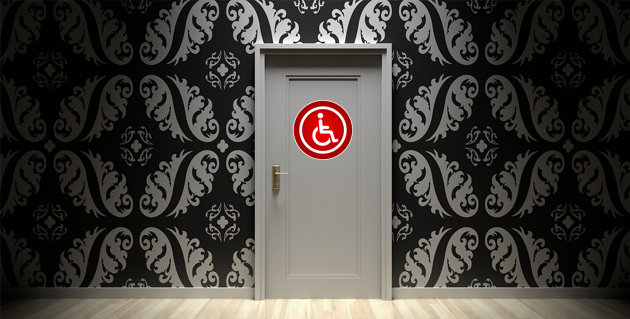- 153Shares
by Erin Hawley
Society often frames accessibility as something abled people do to make the world easier to navigate for disabled folks, whether it’s an ambulatory contractor building a ramp at a restaurant, or a hearing employee putting captions on their organization’s videos. But the reality is that disabled people are also making their spaces and creations accessible to other disabled individuals. This is powerful because we know best the importance of having true inclusivity for community spaces, both online and off. The problem is, sometimes, making things accessible is not within our abilities.
For example, at The Geeky Gimp, I ensure all video and audio content posted includes a transcript and closed-captions. In the beginning, I tried doing the captions myself, but it was extremely tiring, taking hours to transcribe just three minutes of audio. I didn’t have the physical strength to type fast enough, so I started hiring folks to do this labor for me. I believe it’s important to offer financial compensation for work if you can, especially to other disabled people, so I was paying $100 and up for the service per project. That’s why I stopped doing my podcast – even as a full-time employee, I can’t afford to put out this type of content regularly.
Many disabled folks rely on Social Security Income, and would not be able to pay for the assistance if they couldn’t transcribe for themselves. Does that mean they shouldn’t make videos? What if that medium is most accessible to them? Where does the responsibility fall to make things accessible?
We should always make our creations and spaces as accessible as we can. Asking for assistance in a public forum, and being upfront about payment or lack thereof, is an option – folks may volunteer, yet it will prove difficult to find someone willing to do this on a regular basis for free. In my example, even the process of finding a volunteer is time-consuming, strenuous, and unrealistic when doing a short video or Twitch stream every day. There are fundraising options like Kickstarter and Patreon, but for most people, these sources are unreliable or financially insufficient to cover a regular staff of transcribers.
I used to think that if you can’t make something accessible, you shouldn’t make it at all. And now I realize how ableist this belief is when we apply it to disabled people – it can further ostracize us. We are already underrepresented in media and in the community, so we shouldn’t hide ourselves and our contributions entirely.
I am trying to be more solution-oriented in my thinking about disability issues, but there’s no easy solution here. We must continue pushing toward full inclusivity which will enable all of us to help each other out. It will take upending whole systems of power to make this a reality. I’m hoping this post will start us talking about this openly. Through dialogue and an exchange of ideas, I’m hoping we can learn ways to navigate through inaccessibility.
Let me know your thoughts in the comments!


Such a real concern that I’m often confronted by – thanks for putting this so clearly and compassionately. I’d love to see more public funding for captioning etc. I appreciate your saying that it’s ableist and further marginalizing for disabled ppl to not put media out there if it’s not accessible. Going to reflect on this more – looking forward to reading other people’s thoughts too!
I know of some small colleges who use Amara.org to get videos captioned for free in situations where they can’t afford to hire a vendor. https://amara.org/en/. I’ve not used it personally, but I’ve been told it’s actually fairly simple and quick. Crowd sourced captioning, we could all participate in the solution.
If you use PowerPoint, you can add Microsoft Translator which will caption automatically
Fascinating, yes. I’m working on a website right now to serve as a home for my writing and pastoral care efforts within the disabled community. I have ME/CFS and even the basic act of posting is often too much for me. But I want to be inclusive and make my work available to everyone, which means on top of pushing myself to write and post content, I need to transcribe, caption, check the accessibility of links I post, etc etc. All of which makes my own project pretty inaccessible to me as a severely sick person. But that doesn’t make it any less important, so how do you strike the balance? I’ve been getting so nervous about how I’m going to manage it that I’ve thought about giving up on the project all together. Your post gave me a whole new way to think about it, so thank you.
“I used to think that if you can’t make something accessible, you shouldn’t make it at all. And now I realize how ableist this belief is when we apply it to disabled people – it can further ostracize us. We are already underrepresented in media and in the community, so we shouldn’t hide ourselves and our contributions entirely.”
I feel this so much as a podcaster (Writing Alchemy) whose work focuses on disability and who currently does not have the budget for episode transcription.